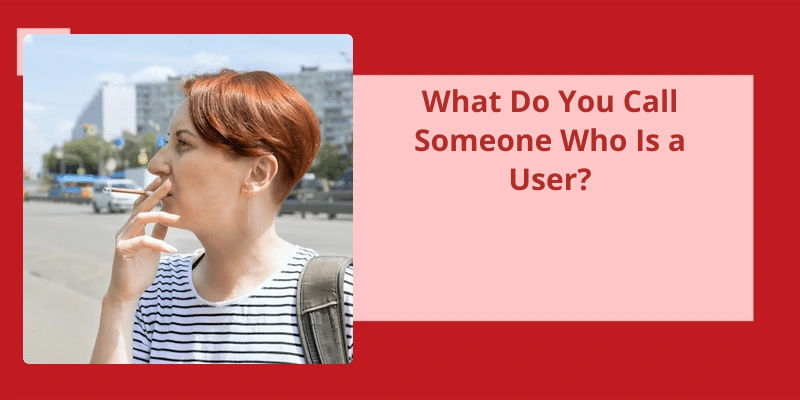However, not all users are exploitative. In fact, being a user can have both positive and negative connotations depending on the context. Generally speaking, a user is someone who utilizes or interacts with a particular system, product, or service. This can range from a casual user of social media, to a power user of a particular software program. The term user can also be applied in a broader sense to describe anyone who consumes or benefits from something, such as a user of healthcare services or a user of public transportation. Ultimately, the connotations associated with being a user depend on the actions, intentions, and outcomes of the individual in question.
What Does It Mean if Someone Is a User?
The term “user” can refer to a wide variety of things in todays society. While it’s most commonly associated with technology, it can also be used to describe individuals who’re dependent on certain substances or habits. In this sense, a user is someone who engages with the object or activity in question frequently or habitually. For example, someone who smokes cigarettes may be considered a user of nicotine, while someone who spends hours each day on social media may be considered a user of that particular website.
Being a user can have both positive and negative connotations, depending on the context. On the one hand, being a user of certain technologies or services can be seen as a sign of engagement, interest, and participation. Many platforms and services are designed with users in mind, and strive to create engaging, intuitive experiences that encourage users to return again and again. However, being a user can also be a sign of addiction or dependency, particularly when it comes to drugs, alcohol, or other dangerous substances.
Regardless of the context, being a user is a key part of our modern world. From social media to addictive substances, we’re constantly bombarded with stimuli that encourage us to engage more, spend more time, and consume more. While there are certainly benefits to engaging with these technologies and services, it’s important to be aware of the risks and to take steps to ensure that we’re using these tools and products in a responsible, safe manner. Whether we choose to be users or not, the fact remains that we’re all connected to a complex web of interconnected technologies, services, and substances that shape our lives in countless ways.
While it may seem like an uncommon behavior, being a user is unfortunately not a rare occurrence in today’s society. Such individuals tend to take advantage of others’ kindness or connection solely for their own benefit, without any regard for the other person’s feelings or well-being. In the following sections, we will explore the concept of being a user in more depth and discuss some ways in which one can identify and deal with such people.
What Does It Mean to Be Such a User?
Being a user isn’t a trait that anyone should aspire to. It’s a selfish and manipulative way of interacting with others, using them only for personal gain without regard for their feelings or wellbeing. Such users often have a calculated agenda, seeking out those who they perceive as vulnerable or easily manipulated to further their own interests.
The impact of being used can be devastating for those who fall prey to such manipulators. They may feel violated, exploited, and powerless in the situation. Being in a relationship with a user can be emotionally and psychologically draining, causing long-term damage if left unchecked.
It’s crucial to recognize the warning signs of being used by someone else in a relationship. This includes an unequal balance of power, a lack of communication, and a sense of being used for ones own personal gain. By staying mindful and aware, individuals can better protect themselves from becoming the victim of a user.
Ultimately, being a user is a negative and destructive way of interacting with others. It undermines the foundation of trust and mutual respect that’s necessary for healthy relationships. By recognizing the warning signs and avoiding these toxic relationships, individuals can cultivate healthier, more positive connections with others, built on a foundation of mutual respect and genuine care and concern for one another.
When it comes to referring to people who use a particular product or service, there are several words that can be used interchangeably. “User” is the most common term, but there are other synonyms that can be used depending on the context. Some of these include “buyer,” “customer,” “purchaser,” and “shopper,” all of which convey the same basic meaning. In the next section, we’ll take a closer look at why using the right term is important and how it can impact your communication strategy.
What Is Another Word for User Person?
Individuals, organizations, and businesses rely on different communication channels to reach their intended audiences. These audiences are diverse and unique, hence the need to identify their needs and preferences to tailor communication efforts for maximum impact. In this context, the term user person refers to an individual who relies on a particular product, service, or platform to meet a specific need or goal. However, there are other words that can be used to describe such individuals, depending on the context of use.
One of the synonyms of a user person is a consumer. Consumers make various decisions related to purchasing, including evaluating products or services, negotiating prices, and using the product or service. The role of consumers in the economy can’t be understated, as they’ve a significant impact on the demand and supply of products and services.
Similar to a consumer, a buyer is an individual who purchases goods or services for their personal use or consumption. However, the term buyer is more often used in the context of business-to-business transactions, where companies purchase goods or services from other companies to meet their organizational needs. In this context, a buyers role involves identifying and evaluating potential suppliers, negotiating prices and contracts, and monitoring supplier performance.
In the retail industry, the term customer is often used to describe a user person. The relationship between a customer and a seller is often characterized by repeated interactions, where the customer provides feedback, expresses satisfaction or dissatisfaction, and recommends the product or service to others. Retailers use various strategies to attract and retain customers, including offering discounts, loyalty programs, and personalized experiences.
A purchaser is another word used to describe a user person. Unlike buyers, purchasers are tasked with finding and purchasing products or services that meet specific organizational needs while adhering to procurement policies and guidelines. Purchasers play a critical role in supply chain management, ensuring that the right products are obtained at the right price and quality.
Finally, a synonym of a user person is a shopper. A shopper is an individual who browses and purchases products from retailers, either online or in-store. Shopping is often considered a leisure activity, where individuals engage in the process of discovering and acquiring new products. Retailers invest heavily in creating a positive shopping experience, using various tactics such as product displays, promotional offers, and customer service to attract and retain shoppers.
Source: 19 Synonyms & Antonyms for USER – Thesaurus.com
Conclusion
There are those who truly use a product or service for it’s intended purpose and contribute to it’s success. These types of users are essential for the growth and innovation of any industry. Therefore, it’s important to differentiate between a user and an exploiter. The former is valuable and necessary, while the latter is detrimental and should be condemned. It’s up to individuals to decide how they want to use their resources and whether they want to contribute positively or negatively to society.






